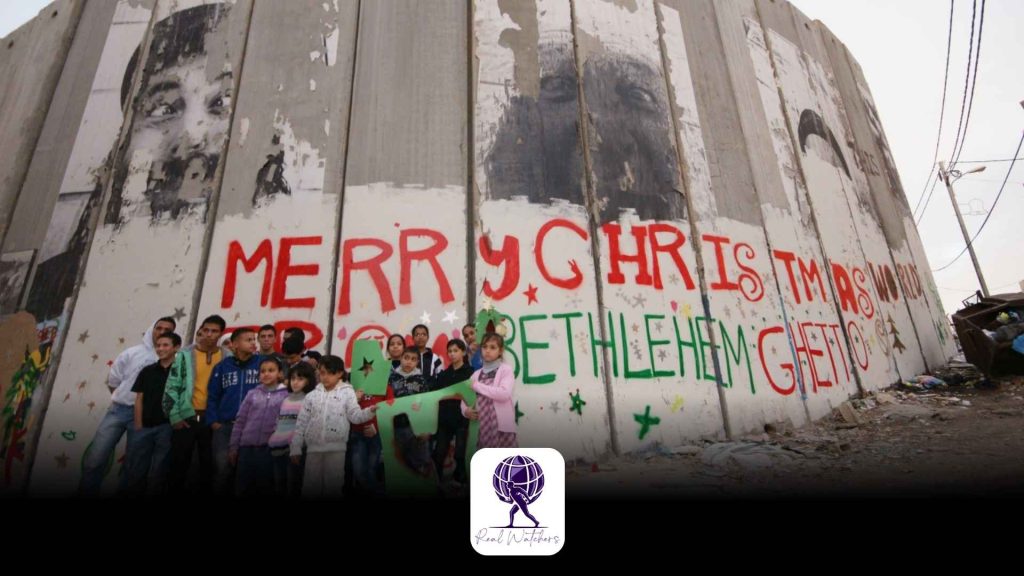In the occupied West Bank, the small town of Bethlehem traditionally prides itself on being the capital of Christmas. However, this year, the festive spirit is lacking.
Attendance is notably low during what is usually considered a peak period for visitors. This year, the absence of the customary festive street decorations and the towering Christmas tree in front of the Nativity Church, located at the site believed to be the birthplace of Jesus, is notable.
For the second consecutive year, public celebrations of Christmas have been called off due to the ongoing conflict in Gaza. Palestinian Christians are participating solely in religious ceremonies and family gatherings.
“This should be a time of joy and celebration,” said Reverend Dr. Munther Isaac, a pastor from the local Lutheran community. Bethlehem is a sombre town expressing solidarity with its counterparts in Gaza.”
At his church, the Nativity scene depicts baby Jesus resting amidst a heap of debris. As Christmas approaches, a prayer service has been dedicated to addressing the dire circumstances unfolding in Gaza.
“It’s difficult to comprehend that yet another Christmas has arrived while the genocide continues unabated,” Isaac stated during his impassioned sermon. Decision-makers appear to be satisfied with allowing this situation to persist. For them, Palestinians hold little value.
Israel has firmly rejected allegations of genocide in Gaza. At the same time, judges at the United Nations’ highest court have not yet decided on a case claiming genocide, which South Africa initiated.
Numerous Christians from Bethlehem express despair and raise concerns about what they perceive as a lack of response from other Christian communities globally.
The strong connections within the tiny Palestinian Christian community result in many residents having relatives and friends in Gaza.
“According to theologian Dr Yousef Khouri, originally from Gaza City, ‘what we see on television doesn’t capture one per cent of what’s happening,'” he reveals.
A few hundred Christians, including his parents and sister, have been taking refuge in two churches in Gaza for the past 14 months.
“The population faces conditions akin to starvation, much like those experienced throughout the Gaza Strip.” “Naturally, there is nearly no sleep due to the constant bombardment, the drones hovering overhead, and the absence of medical attention and services,” he states.
“The community has experienced the profound loss of friends and relatives.”
In Gaza, the death toll has surpassed 45,000 as the conflict escalates following the Hamas attacks on southern Israel. The figures originate from the health ministry operated by Hamas, yet they are deemed reliable by the United Nations and other organizations. On 7 October 2023, an attack resulted in the deaths of approximately 1,200 individuals, including both Israelis and foreign nationals, while around 250 people were reported taken hostage.
As the war continued, tensions in the West Bank escalated significantly. In a significant move, Israel has enacted new restrictions on the movement of Palestinians, resulting in the cancellation of tens of thousands of permits that previously allowed workers to cross into Jerusalem or Jewish settlements daily.
The economy faces significant challenges, particularly in Bethlehem, where the tourism sector, a vital revenue source, has nearly stopped. Guides linger near the Nativity Church, offering food to the pigeons.
“When tourists arrive, it triggers a chain reaction in the local economy,” guides Abdullah. “Everyone benefits—hotels, transportation services, and accommodations all thrive.” “Without tourists, Bethlehem city lacks vitality.”
“I find myself in a challenging financial situation.” There is a lack of commercial activity. “We have been staying home for over a year now,” says Adnan Subah, a souvenir seller on Star Street.
My son serves as a tour guide at the church while the rest of us remain home, with all my children staying in. The absence of employment opportunities, business activity, and tourist presence is palpable.
In the past year, numerous local Christian and Muslim families have made the decision to emigrate. The ongoing threat of violence and the expansion of settlements on territories where Palestinians have historically pursued an independent state contribute to a growing sense of fear and uncertainty regarding the future.
A community group in Bethlehem is taking action by assembling food parcels for individuals in need. Without governmental support, volunteers have taken the initiative to gather donations, reaching out to individuals in the diaspora for contributions.
Christmas embodies generosity, affection, and happiness. “With this parcel, we aim to bring hope and joy to the families in our area,” states Wael Shaer, the head of the Palestine Lions Club.
Wael embarks on his inaugural delivery, heading towards a nearby apartment where a woman awaits his arrival. Her husband is currently unwell and unable to work. She opens the box of supplies with gratitude and retrieves an envelope filled with cash.
In a traditional holiday greeting exchange, she and Wael convey their wishes for a peaceful year ahead.
“The mission has been completed!” As we set off, Wael shared his thoughts with me.
“Bringing joy during the holiday season.”








